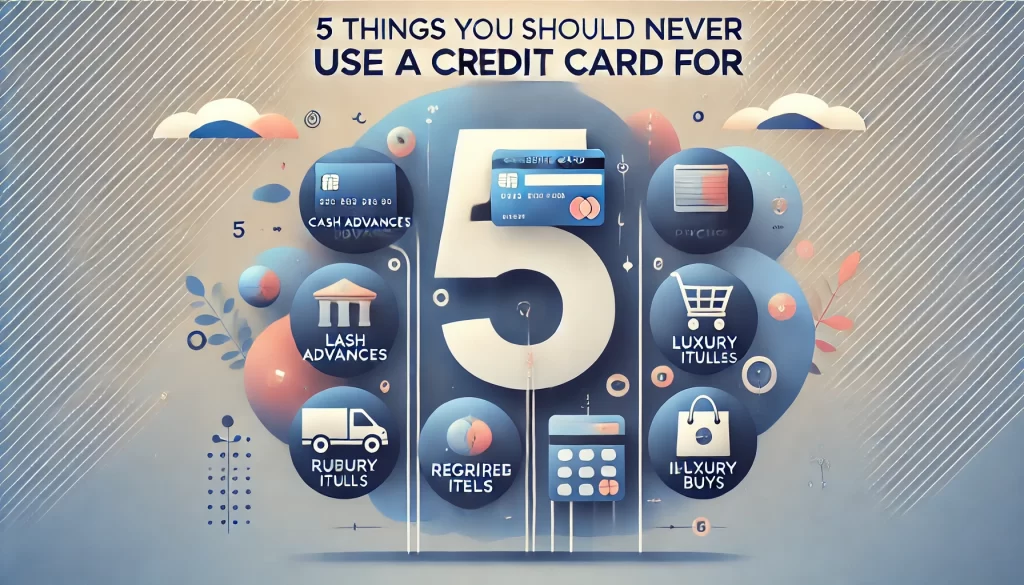Credit cards have many benefits, but using them the wrong way can cause big financial problems. Americans have an average credit card balance of $6,194. This shows the dangers of not using credit cards wisely. We’ll talk about five things you should avoid using credit cards for to keep your finances strong.
Key Takeaways
- Avoid using credit cards for monthly rent or mortgage payments due to high processing fees.
- Large purchases that max out your credit limit can damage your credit utilization rate.
- Medical bills paid with credit cards can accrue high-interest rates over time.
- Small impulse splurges may lead to mounting credit card debt if not controlled.
- Paying taxes with credit cards incurs additional processor fees, with better alternatives available.
Understanding the Basics of Credit Card Use
Credit cards can be useful for building credit, managing money, and earning rewards if used correctly. But, misusing them can lead to financial trouble. Knowing what not to charge can help you avoid getting into debt and keep your finances healthy.
The Potential Pitfalls of Misusing Credit Cards
Credit card interest rates are usually much higher than other credit types. Fees add to the cost, making small expenses turn into big financial burdens. Using credit cards for big or ongoing costs can make repaying harder and lead to a cycle of debt.
Using credit cards wisely is key to good financial health. By following important credit card guidelines, you can avoid common mistakes and use credit cards to your advantage. With more people relying on credit cards, knowing the basics is vital.
Understanding the Basics of Credit Card Use
The basics of credit card use include knowing how credit works. This includes understanding annual percentage rates (APRs) and the grace period. Credit cards usually have a higher APR than other loans. Knowing the grace period of at least 21 days is important, as it stops interest from adding up right away on purchases.
Credit cards often offer rewards like airline miles, cashback, and hotel rentals to draw in customers. But, these rewards can come with annual fees, which can be between $50 to $700. Secured credit cards are also an option for those with bad credit, requiring a deposit.
| Credit Card Feature | Details |
|---|---|
| APR | Higher than other consumer loans |
| Grace Period | At least 21 days |
| Incentives | Airline miles, cashback, hotel rentals |
| Annual Fees | $50 to $700 |
| Secured Credit Cards | Require a security deposit |
The Potential Pitfalls of Misusing Credit Cards
Credit cards are convenient and offer rewards, but misusing credit cards can cause financial trouble. High-interest rates can lead to growing debt if you don’t pay off your balance each month. Late payment fees, up to $27 for the first time, can also hurt your finances.
Good financial planning is key to handling credit cards well. Avoid using all your credit and keep your credit use low to improve your credit score. Be aware of foreign transaction fees, usually 1% to 3%, when using your card abroad.
By following these credit card guidelines, you can make better financial choices and keep your credit in good shape.
Monthly Rent or Mortgage Payments
Using a credit card for rent or mortgage payments might seem easy, but think about the hidden costs. These costs can affect your financial stability.
Processing Fees and Costs
One big issue is the credit card processing fees you’ll face. For example, Plastiq charges up to 2.9% for rent payments. PlacePay adds a 2.99% fee for credit and debit cards. Venmo and RentMoola also charge 3% and 2.99% for credit card use.
To show you:
| Service | Credit Card Fee | Accepted Cards |
|---|---|---|
| Plastiq | 2.9% | Diners Club, Discover, Mastercard, Visa |
| PlacePay | 2.99% | American Express, Discover, Mastercard, Visa |
| RentMoola | 2.99% | American Express, Mastercard, UnionPay, Visa |
| Venmo | 3% | American Express, Discover, Mastercard, Visa |
A $1,000 rent payment with a 2.99% fee adds $29.90 extra each month. Even with rewards, the fees might be more than the benefits. But, the Bilt Mastercard is an exception. It doesn’t charge these fees and rewards you with 1 point per dollar spent on rent, up to 100,000 points a year.
Impact on Your Financial Stability
Using credit for big expenses can hurt your financial stability. If you often use credit for rent or mortgage, you might be spending too much. High credit use can lower your credit score, which is bad for your finances.
Also, paying with credit shouldn’t lead to more interest costs. High interest rates can make the cost even higher. Experts say to avoid this unless the rewards are worth the fees and you pay off the balance quickly.
Keep these points in mind:
- Think about the rewards and fees before using credit for big payments.
- Make sure to pay in full and on time to avoid interest.
- Watch your credit score to keep your finances stable.
Even though services like Plastiq and PlacePay are convenient, know the true cost of using them. Paying rent and mortgage with a credit card should be done carefully and with a plan.
Large Purchases That Max Out Your Credit
Using a credit card for big buys might seem easy, but it can lead to financial trouble. It’s key to know how maxing out your credit can affect your scores and lead to debt.
Damage to Your Credit Utilization Rate
Your credit utilization rate is a big part of your credit score. High charges can lower it. Experts say keep your credit use under 30% for a good score. For example, if you have $10,000 available credit, don’t spend more than $3,000.
Even with rewards, like earning $100 for paying on time, it’s smart to avoid high balances. This keeps your credit score healthy.
Accumulating Interest and Debt
High-interest rates can quickly increase your credit card debt. The average rate is about 20%. If you don’t pay off your balance fast, interest accumulation can get out of control.
Options like buy now, pay later or zero-percent intro APR can help with big buys. They let you pay over time without immediate interest. But, be careful with balance transfers, as fees can be 3% to 5% of the transfer amount.
Personal loans often have lower rates than credit cards. They can be a smart choice for big expenses.
| Option | Average Interest Rate | Pros | Cons |
|---|---|---|---|
| Credit Cards | 20% | Rewards, Convenience | High-Interest Fees, Can Hurt Utilization Rate |
| Buy Now, Pay Later | Fixed Lower Rate | Interest-Free Options, No Credit Check | Potential Fees, Limited Vendors |
| Personal Loans | 5% – 15% | Lower Interest Rates, Fixed Payments | Possible Origination Fees, Credit Check Required |
| 0% Intro APR Credit Cards | 0% for Intro Period | Interest-Free Payments, Extended Time to Pay | Typical High Post-Intro Rates, Balance Transfer Fees |
| High-Yield Savings Accounts | 4.64% | Generates Additional Income, Savings Security | Contribution Limits, Requires Discipline to Save |
Medical Bills
Paying medical bills with a credit card might seem like a quick fix, but it’s important to understand the financial burden it can create. High credit card interest rates can make your debt worse. It’s key to look into other ways to pay.
The Burden of Interest Rates
Credit card interest rates are about 22.77% on average as of August 2023, higher than the national average. Using a credit card for medical bills can lead to a lot of interest over time. For example, charging a $3,000 bill on a card with a 22.77% rate could mean paying more in interest.
This isn’t all; medical debt on credit reports can lower your credit score by over 100 points. This can greatly affect your financial stability.
Alternative Payment Options
Instead of using credit cards, look into other ways to pay for healthcare costs. Many hospitals and healthcare providers offer payment plans with lower interest rates than credit cards. These plans can be adjusted to fit your budget, making it easier on your wallet.
Also, 0% balance transfer offers can help pay off medical debts without extra interest. Building an emergency fund is also a good idea to cover unexpected medical costs without the high cost of credit card interest.
As of March 2022, medical bills made up $88 billion of reported debts on credit reports. This shows how important it is to choose your payment options wisely to avoid long-term financial problems.
| Payment Option | Pros | Cons |
|---|---|---|
| Credit Card | Convenient, potential rewards or cash back | High interest rates, potential for increased debt |
| Payment Plans | Lower interest rates, flexible | May require negotiation with provider |
| Emergency Fund | Avoids debt, interest-free | Requires prior savings and planning |
| 0% Balance Transfer | Interest-free period to pay off debt | May involve transfer fees |
Small Impulse Splurges
Small impulse buys can quickly add up and cause big financial problems. These purchases often delay the payment pain and hide how much we’re spending. This makes it hard to stay disciplined with money. Studies show that 40% to 80% of what we buy is on impulse, which is a big part of our spending.
Avoiding the Temptation
To fight credit card temptations, we need to know and avoid places that make us spend more. In stores, 40% of people spend more than they planned, but only 25% do online. This shows how important the shopping setting is in making us buy impulsively. Things like ads, store design, and sales can make us want to spend more than we should.
Practical Tips for Better Control
To keep spending in check, we need good strategies and tips. Here are some ways to stop impulse buying:
- Having a budget and following it helps a lot. Keeping track of expenses helps with financial discipline.
- Setting SMART savings goals helps focus on long-term goals, making us less likely to want instant buys.
- Shopping with a list before going to the store helps make sure we buy only what we need and stay within budget.
- Using cash instead of credit cards gives us a clear view of how much we’re spending, helping us spend less.
- Choosing curbside pickup can reduce the temptation of seasonal items and sales, helping us buy less on impulse.
Creating ways to fight credit card temptations and improve financial discipline is key. Whether it’s setting a personal spending limit or sticking to a budget, these steps can help control spending and keep finances stable over time.
Paying Your Taxes
Paying taxes comes with costs and things to think about, especially when using credit cards. Using a credit card might seem easy, but knowing about the fees is key.
Processor Fees and Costs
When you pay taxes with a credit card, different processors charge different fees. For example, PayUSAtax.com has a credit card fee of 1.82%, with a minimum of $2.69. Pay1040.com charges 1.87%, or a minimum of $2.50 by credit card, and ACI Payments, Inc. charges 1.98% with a $2.50 minimum.
If you use a debit card, the fees are lower. PayUSAtax.com charges $2.14, and Pay1040.com has a $2.50 or 1.87% fee for debit cards. ACI Payments, Inc. charges $2.20 for debit cards.
| Payment Processor | Credit Card Fee | Debit Card Fee |
|---|---|---|
| PayUSAtax.com | 1.82% (min $2.69) | $2.14 |
| Pay1040.com | 1.87% (min $2.50) | 1.87% or $2.50 min |
| ACI Payments, Inc. | 1.98% (min $2.50) | $2.20 |
These credit card fees can make your tax bill much higher. It’s smart to look for other ways to pay.
Better Alternatives to Using Credit Cards
Instead of paying credit card fees, experts suggest other options. Setting up IRS payment plans can be a good choice. These plans usually have lower interest rates than credit cards.
Using a debit card for taxes is another good option with lower fees. Some methods, like direct bank transfers, might even be free. Looking into these alternatives can help you find a way that fits your budget and makes paying taxes easier.
Conclusion
Using credit cards wisely is key to keeping your finances healthy and avoiding extra fees. Treat them like cash to avoid overspending and debt. Keeping track of your spending helps you manage your money better.
Don’t use credit cards for rent, big buys, medical bills, small impulse buys, or taxes. These can lead to high fees over time. Using other payment options can help keep your finances stable.
Credit cards can also offer cash back and rewards if used smartly. Cards like the Blue Cash Preferred® Card from American Express and the Chase Freedom Flex® card show how you can earn a lot each year. But, it’s important to keep your credit use low, pay on time, and use credit wisely to keep a good credit score. Checking your credit reports from Equifax, Experian, and TransUnion helps keep your financial info correct, which is good for your financial health.
FAQ
Why shouldn’t I use a credit card for paying monthly rent or mortgage payments?
Using a credit card for rent or mortgage payments can lead to high fees. These fees can erase any rewards you might get. It also shows you might be spending more than you can afford.
What are the risks of making large purchases with a credit card?
Big purchases can hurt your credit score by increasing your credit use. If you don’t pay them off fast, you’ll face high interest. This can lead to a lot of debt.
Is it wise to pay for unexpected medical bills with a credit card?
Paying medical bills with a credit card can cause long-term financial stress because of high interest. It’s better to save up for emergencies or look for payment plans with lower interest.
Why should I avoid using a credit card for small impulse purchases?
Small impulse buys can quickly add up, causing you to spend more than you planned. It’s better to use specific funds for these and check your credit card balances often to avoid spending too much.
What are the disadvantages of using a credit card to pay my taxes?
Paying taxes with a credit card adds extra fees to what you owe. Look into IRS payment plans or debit card payments instead. They usually have lower or no fees.
How can high-interest rates on credit cards affect my financial health?
High-interest rates can make your debt grow fast if you don’t pay off your balance each month. This can make it hard to pay off your debt and can worsen your financial situation. Always try to pay your balance in full each month.
Are there specific credit cards that can help me avoid these pitfalls?
Yes, use low-interest, balance transfer, or no annual fee credit cards for better terms. Always check credit card offers to find ones that fit your financial needs.
How can building an emergency fund help me avoid relying on credit cards?
Saving for emergencies gives you a safety net for unexpected costs, reducing your need for high-interest credit cards. This keeps you financially stable and helps you avoid debt.
What are the benefits of responsible credit card usage?
Using credit cards wisely can boost your credit score, give you financial flexibility, and let you enjoy rewards without getting into debt. Treat your credit cards like cash and only spend what you can pay back each month to avoid extra fees and financial problems.






